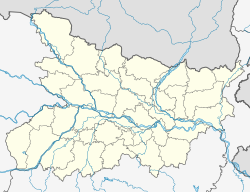| Aurangabad | |
|---|---|
| Community development block | |
  | |
| Coordinates: 24°42′N 84°21′E / 24.70°N 84.35°E / 24.70; 84.35 | |
| Country | |
| State | Bihar |
| District | Aurangabad subdivision |
| Government | |
| • Type | Representative democracy |
| Area | |
| • Total | 282.1 km (108.9 sq mi) |
| Population | |
| • Total | 283,193 |
| • Density | 1,000/km (2,600/sq mi) |
| Languages | |
| • Official | Hindi |
| Time zone | UTC+5:30 (IST) |
| PIN | 824101 |
| STD code | 06186 |
Aurangabad is a community development block in Aurangabad subdivision, Aurangabad district, Bihar, India.
Geography
The topography of the area consists of flat alluvial plains and is a part of the Gangetic depression with deep alluvial deposits broken occasionally by low hill ranges. This information relates to Aurangabad subdivision of Gaya district in 1957. Topographically, Aurangabad district can be divided into hard core rock region and Jalodhak region.
Aurangabad community development block is bounded by Obra block on the north, Rafiganj block and Madanpur block on the east, Deo block on the south and Barun block on the west.
Gram Panchayats
Gram panchayats in Aurangabad community development block are: Pokhra, Bela, Ibrahimpur, Karma Bhagwan, Khaira Bind, Khaira Mirja, Kurmahan, Manjhar, Naugarh, Ora, Parawan, Parasdih, Phesar, Poiwan, Jamohar and Aurangabad (NT).
Civic Administration
Blocks are a part of the subdivision in Aurangabad district.
There is a Mufassil police station at Aurangabad.
Demographics
In the 2011 census Aurangabad community development had a total population of 283,193, of which 180,949 were rural and 102,244 were urban, the highest urban population among the community development blocks in the Aurangabad district.
Hindi is the official language of the state. Urdu is serving as a second language in certain districts for specific purposes.
The literacy rate of Aurangabad district in 2001 was 57.50%. It was 71.99% for males and 42.04% for females.
Poverty
According to a World Bank Study, in 2012, 34% of the population of Bihar lived below poverty line. In Aurangabad district, 37-47% of the people lived below poverty line.
Economy
Agriculture
Aurangabad district, with an agricultural economy, lies in a drought-prone area. Rice, wheat, gram lentil and rapeseed are the main crops.
Aurangabad community development block has a geographical area of 28,210 ha, net sown area is 15,415 ha, area sown more than once is 1,039 ha, gross sown area is 16,454 ha, gross area irrigated is 14,031.
BRGF
Aurangabad district received funds from the Backward Regions Grant Fund (BRGF), a fund financed by the central government to redress regional imbalances from 2006 to 2007. All 38 districts of Bihar receive allocations from BRGF.
Education
Ram Lakhan Singh College, a degree college, was established at Aurangabad, Bihar in 1971.
See also
References
- ^ "District Aurangabad". Subdivision & Blocks and Economy. Government of Bihar. Retrieved 20 June 2023.
- "Bihar District Gazetteer: Gaya by P.C. Roy Chaudhury, 1957". Topography: Physical Divisions. Ministry of Culture, Government of Bihar. Retrieved 21 June 2023.
- "Brief Industrial Profile of Aurangabad" (PDF). Ministry of MSME, Government of India. Retrieved 21 June 2023.
- "Aurangabad Tehsil Map". Maps of India. Retrieved 21 June 2023.
- "BMVM". District-Block-Panchayat-Village code. Bihar Mahadalit Vikas Mission, Department of SC & ST, Government of Bihar. Retrieved 22 June 2023.
- "View Police Station". Mufassil PS. Bihar Police. Retrieved 22 June 2023.
- "Aquifer Mapping and Management of Ground Water Resources: Aurangabad district" (PDF). Demographic details of Administrative Blocks of Aurangabad district, Table1, page 4. Central Water Board, River Development and Ganga Rejuvenation, Ministry of Jal Shakti, Government of India. Retrieved 20 June 2023.
- "The Bihar Official Language Act, 1950" (PDF). Cabinet Secretariat Department, Government of Bihar. 1950. Archived from the original (PDF) on 13 April 2015. Retrieved 22 June 2023.
- Benedikter, Thomas (2009). Language Policy and Linguistic Minorities in India: An Appraisal of the Linguistic Rights of Minorities in India. Münster: LIT Verlag. p. 89. ISBN 978-3-643-10231-7. Archived from the original on 19 October 2015. Retrieved 22 June 2023.
- "Census Statistics". Literacy. Wayback machine archival of original file of Government of Bihar. Archived from the original on 2008-05-24. Retrieved 21 June 2023.
- "Bihar: Poverty, Growth and Inequality" (PDF). World Bank Document. Retrieved 21 June 2023.
- "Ground Water Information Booklet Aurangabad District, Bihar State" (PDF). Status of agriculture and irrigation, Table 4, Page 15 - Agriculture and Irrigation status in Aurangabad district of Bihar. Central Ground water Board Ministry of Water Resources, Government of India. Retrieved 20 June 2023.
- "BRGF heat on purse for rural development". Dev Raj. The Telegraph, 5 April 2016. Retrieved 21 June 2023.
- "Backward Regions Grant Funds: Programme Guidelines" (PDF). Ministry of Panchayati Raj, Government of India. Archived from the original (PDF) on 30 October 2017. Retrieved 21 June 2023.
- "Ram Lakhan Singh Yadav College". RLSYC. Retrieved 21 June 2023.
| Magadh division topics | |
|---|---|
| General | |
| Districts | |
| Community development blocks | |
| Rivers | |
| Transport | |
| Railway stations | |
| Lok Sabha constituencies | |
| See also | |
| Other divisions | |